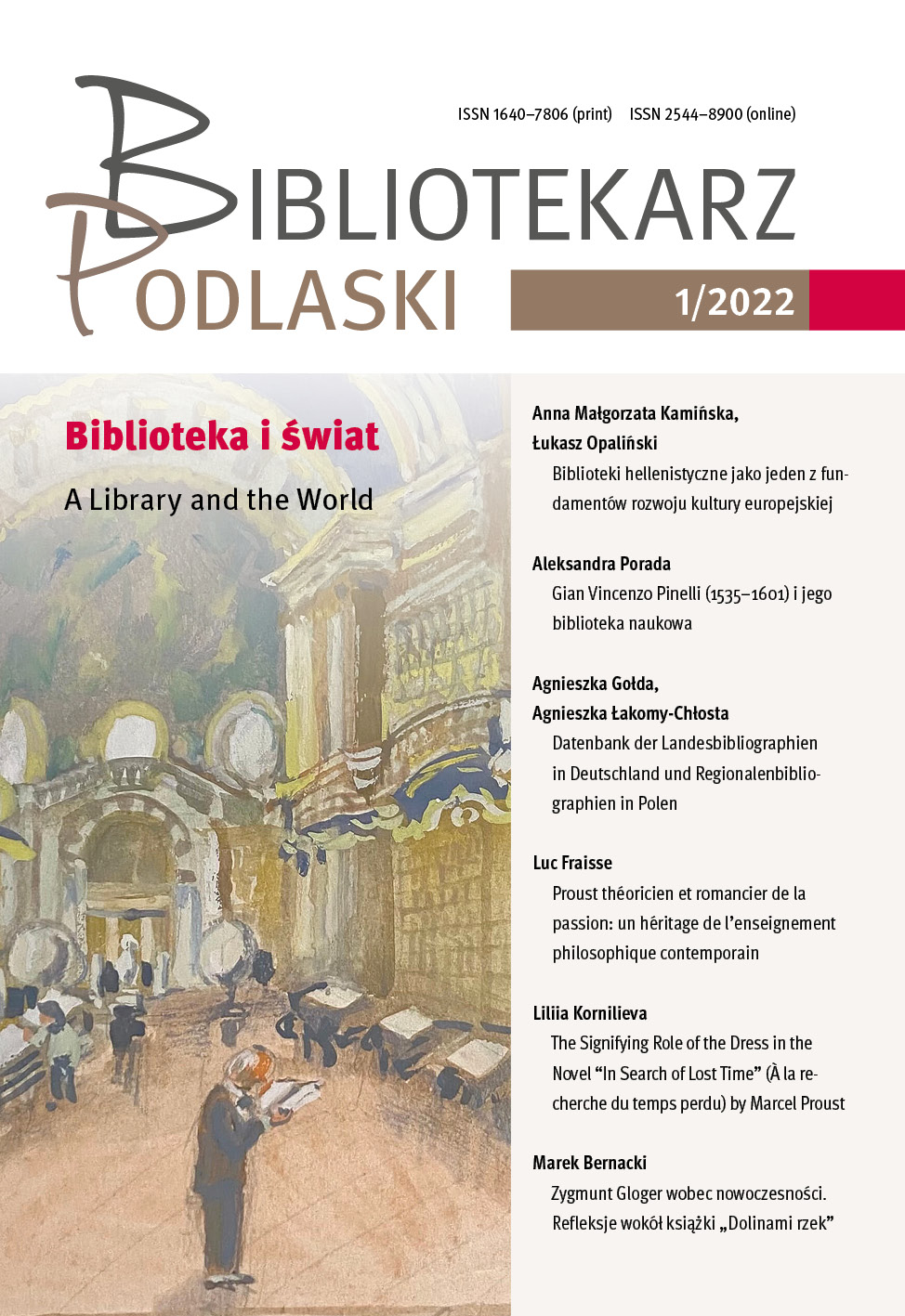Abstract
The article deals with the topic of the architecture of digital collections presented in the Polish Digital Equestrian Library (Polska Cyfrowa Biblioteka Jeździecka), which is an example of an innovative library-thematic portal. The analysis was based on the nine principles of a good digital collection according to the National Information Standards Organization (NISO). Moreover, the case of the horse stud in Janów Podlaski, as an exemplary search term in the PCBJ catalogue, was presented. The results of the search about the horses’ stud in Janów Podlaski constitute a smaller percentage of the entire collection, but their value is because these materials are unique and can deepen the knowledge about the most famous Polish cultural heritage in the world.
References
Kolasa W. M., Biblioteki cyfrowe na świecie – powstanie i rozwój, [w:] Biblioteki cyfrowe, red. M. Janiak, M. Krakowska, M. Próchnicka, Warszawa, Stowarzyszenie Bibliotekarzy Polskich: Nauka – Dydaktyka-Praktyka, 2012.
Morawiec B. M., Architekci i użytkownicy bibliotek cyfrowych. wybrane aspekty na przykładzie Małopolskiej Biblioteki Cyfrowej oraz Jagiellońskiej Biblioteki Cyfrowej, „Debiuty Bibliologiczno-Informatologiczne” 2015, nr 3: Pamięci Profesor Wandy Pindlowej, s. 148-164.
Tedd L. A., Large J. A., Digital libraries: principles and practice in a global environment, München, K. G. Saur, 2005.
Źródła elektroniczne:
A Framework of Guidance for Building Good Digital Collections. Wyd. 2. Bethesda: NISO Framework Advisory Group. 2004. http://www.niso.org/framework/framework2.pdf oraz http://framework.niso.org [dostęp: 08.09.2021].
Biblioteka Cyfrowa Centralnego Ośrodka Doskonalenia Nauczycieli http://bc.codn.edu.pl/ [dostęp: 08.09.2021].
BoberTeam https://boberteam.pl/ [dostęp: 08.09.2021].
Dziennik Ustaw Rzeczypospolitej, dn. 5 grudnia 2017 r. Rozporządzenie Prezydenta Rzeczypospolitej Polskiej z dn. 22 listopada 2017 r. w sprawie uznania za pomnik historii „Janów Podlaski- stadnina koni” https://nid.pl/pl/Informacje_ogolne/Zabytki_w_Polsce/Pomniki_historii/2017/listopad%202017/Jan%C3%B3w%20Podlaski.pdf [dostęp: 08.09.2021].
Fox E.A. Digital Libraries: Topical Outline. Blacksburg, Virginia Tech. Department of Computer Science. 2001 http://ei.cs.vt.edu/~dlib/tut/FoxAll.pdf [dostęp:08.09.2021].
Gutenberg Project http://www.gutenberg.org/ [dostęp: 08.09.2021].
Jak stworzyć dobre kolekcje? Federacja Bibliotek Cyfrowych, https://fbc.pionier.net.pl/pro/tworzyc-repozytoria-cyfrowe/tworzenie-kolekcji-cyfrowych/ [dostęp:08.09.2021].
Janów Podlaski – stadnina koni. Narodowy Instytut Dziedzictwa. https://zabytek.pl/pl/obiekty/janow-podlaski-janow-podlaski-stadnina-koni [dostęp: 08.09.2021].
Krzyształowicz A. Historia stadniny. Stadnina koni Janów Podlaski. http://www.janow.arabians.pl/pl/historia/stadnina.php [dostęp:08.09.2021].
Małopolska Biblioteka Cyfrowa http://mbc.malopolska.pl/dlibra.html [dostęp: 08.09.2021].
Mazurek C., Parkoła T., Werla M., Rozwój bibliotek cyfrowych w Polsce, materiały Poznańskiego Centrum Superkomputerowo-Sieciowe, s.3 https://lib.psnc.pl/Content/173/Partnerzy%20bibliotek%20-%20PCSS.pdf [dostęp: 08.09.2021].
Morawiec B.M. Biblioteki cyfrowe w Polsce. Blog Lustro Biblioteki https://lustrobiblioteki.pl/biblioteki-cyfrowe-polsce/ [dostęp: 08.09.2021].
O Narodowym Instytucie Dziedzictwa. Narodowy Instytut Dziedzictwa. https://nid.pl/o-nas/ [dostęp: 08.09.2021].
POLONA Biblioteki Narodowej, https://polona.pl/ [dostęp: 08.09.2021].
Polska Cyfrowa Biblioteka Jeździecka, https://pcbj.pl/ [dostęp: 08.09.2021].
Polska Cyfrowa Biblioteka Piosenki, https://bibliotekapiosenki.pl/cbpp [dostęp: 08.09.2021].
Pride of Poland http://prideofpoland.com/ [dostęp:08.09.2021].
Wells H.G., World Brain. Garden Giry, New York, Doubleday, Doran & Go., 1938. https://sherlock.ischool.berkeley.edu/weIls/world_brain.html [dostęp: 08.09.2021].
Wielkopolska Biblioteka Cyfrowa, https://www.wbc.poznan.pl/dlibra [dostęp: 08.09.2021].
Wirtualny Księgozbiór Federacji Bibliotek Kościelnych FIDES, http://digital.fides.org.pl/ [dostęp: 08.09.2021].
Articles published in the “gold open access” mode on the basis of a non-exclusive license agreement between the publisher and the author. Permitted use:
- the publication may be read and stored on any device,
- the publication may be cited (with obligatory reference to the author, the title of the text, as well as the full title, bibliographic address of the issue and page of the journal)
The editorial team of “Bibliotekarz Podlaski” implements an open access policy by publishing materials in the form of the so-called Gold Open Access. From volume 42 (issue 1/2019), the journal is available under the Creative Commons license (Attribution – ShareAlike: CC BY-SA).
The key declarations of the Open Access and Open Science movement, which we fully support, are available on the CEON Open Science website.
COPYRIGHT:
The editorial team of “Bibliotekarz Podlaski” implements an open access policy by publishing materials in the form of the so-called Gold Open Access. The journal is available under the Creative Commons license – Attribution – ShareAlike 4.0: International: CC BY-SA 4.0).
The key declarations of the Open Access and Open Science movement, which we fully support, are available on the CEON Open Science website.
“Bibliotekarz Podlaski” allows its readers to read, download, copy, distribute, print, search and link to the full content of articles. We enable full, immediate, unlimited (both in a territorial, temporal and technical sense) open access to all published content, in accordance with the principle that freely available research increases and accelerates the global development of science and the exchange of knowledge.
The editorial team of “Bibliotekarz Podlaski” encourages authors to place articles published in the journal in open repositories (after the review or the final version of the publisher), provided that a link to the journal’s website is provided.
The journal does not charge the authors any fees for accepting and publishing their texts.


